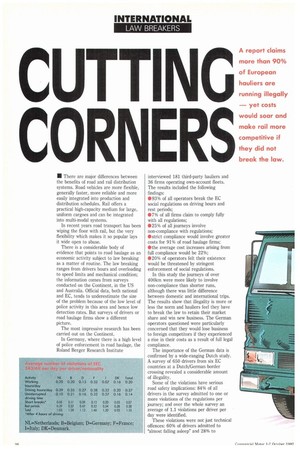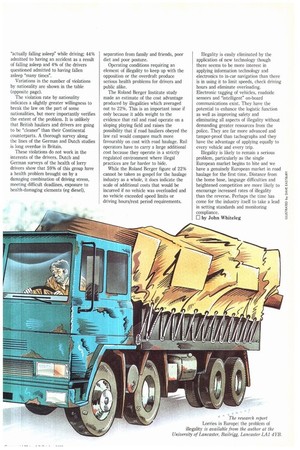• There are major differences between the benefits of road
Page 28

Page 29

If you've noticed an error in this article please click here to report it so we can fix it.
and rail distribution systems. Road vehicles are more flexible, generally faster, more reliable and more easily integrated into production and distribution schedules. Rail offers a practical high-capacity medium for large, uniform cargoes and can be integrated into multi-modal systems.
In recent years road transport has been wiping the floor with rail, but the very flexibility which makes it so popular lays it wide open to abuse.
There is a considerable body of evidence that points to road haulage as an economic activity subject to law breaking as a matter of routine. The law breaking ranges from drivers hours and overloading to speed limits and mechanical condition; the information comes from surveys conducted on the Continent, in the US and Australia, Official data, both national and EC, tends to underestimate the size of the problem because of the low level of police activity in this area and hence low detection rates. But surveys of drivers or road haulage firms show a different picture.
The most impressive research has been carried out on the Continent.
In Germany, where there is a high level of police enforcement in road haulage, the Roland Berger Research Institute interviewed 181 third-party hauliers and 36 firms operating own-account fleets. The results included the following findings: • 93% of all operators break the EC social regulations on driving hours and rest periods;
*7% of all firms claim to comply fully with all regulations;
• 25% of all journeys involve non-compliance with regulations;
*strict compliance would involve greater costs for 91% of road haulage firms;
• the average cost increases arising from full compliance would be 22%; • 20% of operators felt their existence would be threatened by stringent enforcement of social regulations.
In this study the journeys of over 400km were more likely to involve non-compliance than shorter runs, although there was little difference between domestic and international trips. The results show that illegality is more or less the norm and hauliers feel they have to break the law to retain their market share and win new business. The German operators questioned were particularly concerned that they would lose business to foreign competitors if they experienced a rise in their costs as a result of full legal compliance.
The importance of the German data is confirmed by a wide-ranging Dutch study. A survey of 650 drivers from six EC countries at a Dutch/ German border crossing revealed a considerable amount of illegality.
Some of the violations have serious road safety implications: 84% of all drivers in the survey admitted to one or more violations of the regulations per journey; and over the whole survey an average of 1.1 violations per driver per day were identified.
These violations were not just technical offences: 60% of drivers admitted to "almost falling asleep" and 28% to 'actually falling asleep" while driving; 44% admitted to having an accident as a result of falling asleep and 4% of the drivers questioned admitted to having fallen asleep "many times".
Variations in the number of violations by nationality are shown in the table (opposite page).
The violation rate by nationality indicates a slightly greater willingness to break the law on the part of some nationalities, but more importantly verifies the extent of the problem. It is unlikely that British hauliers and drivers are going to be "cleaner" than their Continental counterparts. A thorough survey along the lines of the German and Dutch studies is long overdue in Britain.
These violations do not work in the interests of the drivers. Dutch and German surveys of the health of lorry drivers show that 59% of this group have a health problem brought on by a damaging combination of driving stress, meeting difficult deadlines, exposure to health-damaging elements (eg diesel), separation from family and friends, poor diet and poor posture.
Operating conditions requiring an element of illegality to keep up with the opposition or the overdraft produce serious health problems for drivers and public alike.
The Roland Berger Institute study made an estimate of the cost advantage produced by illegalities which averaged out to 22%. This is an important issue if only because it adds weight to the evidence that rail and road operate on a sloping playing field and raises the possibility that if road hauliers obeyed the law rail would compare much more favourably on cost with road haulage. Rail operators have to carry a large additional cost because they operate in a strictly regulated environment where illegal practices are far harder to hide.
While the Roland Berger figure of 22% cannot be taken as gospel for the haulage industry as a whole, it does indicate the scale of additional costs that would be incurred if no vehicle was overloaded and no vehicle exceeded speed limits or driving hours/rest period requirements. Illegality is easily eliminated by the application of new technology though there seems to be more interest in applying information technology and electronics to in-car navigation than there is in using it to limit speeds, check driving hours and eliminate overloading. Electronic tagging of vehicles, roadside sensors and Intelligent" on-board communications exist. They have the potential to enhance the logistic function as well as improving safety and eliminating all aspects of illegality without demanding greater resources from the police. They are far more advanced and tamper-proof than tachographs and they have the advantage of applying equally to every vehicle and every trip.
Illegality is likely to remain a serious problem, particularly as the single European market begins to bite and we have a genuinely European market in road haulage for the first time. Distance from the home base, language difficulties and heightened competition are more likely to encourage increased rates of illegality than the reverse. Perhaps the time has come for the industry itself to take a lead in setting standards and monitoring compliance.
171 by John Whiteleg
















































































